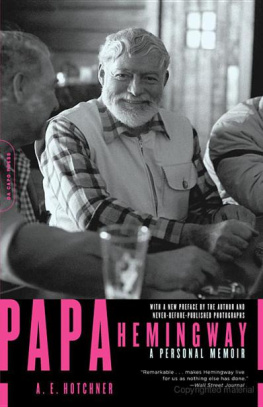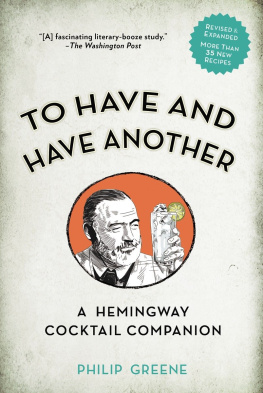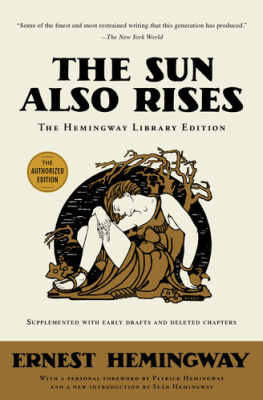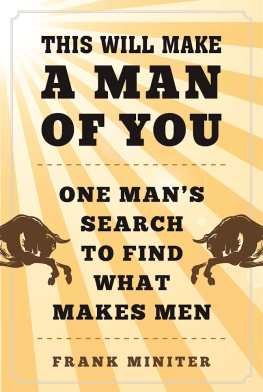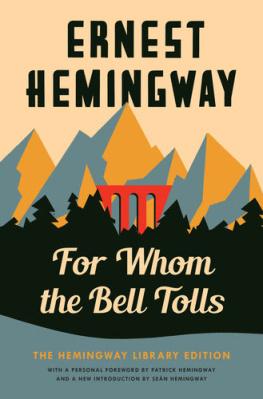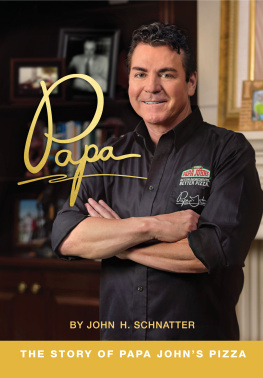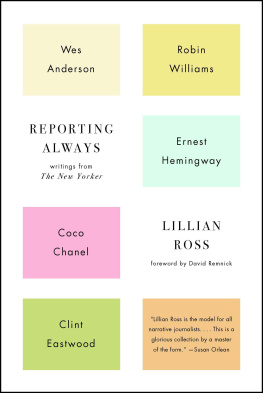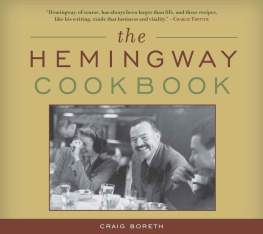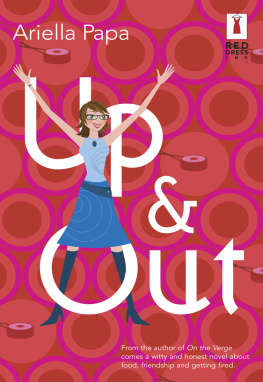A. E. Hotchner - Papa Hemingway: A Personal Memoir
Here you can read online A. E. Hotchner - Papa Hemingway: A Personal Memoir full text of the book (entire story) in english for free. Download pdf and epub, get meaning, cover and reviews about this ebook. year: 2018, publisher: Open Road Media, genre: Detective and thriller. Description of the work, (preface) as well as reviews are available. Best literature library LitArk.com created for fans of good reading and offers a wide selection of genres:
Romance novel
Science fiction
Adventure
Detective
Science
History
Home and family
Prose
Art
Politics
Computer
Non-fiction
Religion
Business
Children
Humor
Choose a favorite category and find really read worthwhile books. Enjoy immersion in the world of imagination, feel the emotions of the characters or learn something new for yourself, make an fascinating discovery.
- Book:Papa Hemingway: A Personal Memoir
- Author:
- Publisher:Open Road Media
- Genre:
- Year:2018
- Rating:3 / 5
- Favourites:Add to favourites
- Your mark:
- 60
- 1
- 2
- 3
- 4
- 5
Papa Hemingway: A Personal Memoir: summary, description and annotation
We offer to read an annotation, description, summary or preface (depends on what the author of the book "Papa Hemingway: A Personal Memoir" wrote himself). If you haven't found the necessary information about the book — write in the comments, we will try to find it.
Papa Hemingway: A Personal Memoir — read online for free the complete book (whole text) full work
Below is the text of the book, divided by pages. System saving the place of the last page read, allows you to conveniently read the book "Papa Hemingway: A Personal Memoir" online for free, without having to search again every time where you left off. Put a bookmark, and you can go to the page where you finished reading at any time.
Font size:
Interval:
Bookmark:
PAPA
HEMINGWAY
a personal memoir
A. E. Hotchner
Carroll & Graf Publishers, Inc. New York
On July 2, 1961, a writer whom many critics call the greatest writer of this century, a man who had a zest for life and adventure as big as his genius, a winner of the Nobel Prize and the Pulitzer Prize, a soldier of fortune with a home in Idaho's Sawtooth Mountains, where he hunted in the winter, an apartment in New York, a specially rigged yacht to fish the Gulf Stream, an available apartment at the Ritz in Paris and the Gritti in Venice, a solid marriage, no serious physical ills, good friends everywhereon that July day, that man, the envy of other men, put a shotgun to his head and killed himself.
How did this come to pass?
Why?
I was his close friend for fourteen years, right up to the day he died. I knew about his life: the adventures, the conversations, the dreams and disillusions, the triumphs and defeats of this complicated, unique, humorous, intense, fun-loving man who was Ernest Hemingway but I cannot tell you why. No one can.
But to tell about his life, I must inevitably tell of his death and the events which preceded it. I gave long and hard thought to thatwhether it should be gone into at all, or parts of it suppressed, or generalized and disguised. But in the end I was guided by what Ernest had told me when I wondered whether I should be as frank and open as he was about Scott Fitzgerald. "Every man's life ends the same way," Ernest had said, "and it is only the details of how he lived and how he died that distinguishes one man from another."
He said that for him there was only one way to account for thingsto tell the whole truth about them, holding back nothing; tell the reader the way it truly happened, the ecstasy and sorrow, remorse and how the weather was, and, with any luck, the reader will find his way to the heart of the thing itself.
That is what I have tried to do, holding back nothing, and it is as close as I can get to the Why.
A. E. HOTCHNER
Rome, 1965
PAPA
HEMINGWAY
I am glad we do not have to try to kill
the stars. Imagine if each day a man must
try to kill the moon. The moon runs away.
But imagine if a man each day should have
to try to kill the sun? We are born lucky.
Yes, we are born lucky.
the old man and the sea
In the spring of 1948 I was dispatched to Cuba to make a horse's ass out of myself by asking Ernest Hemingway to write an article on "The Future of Literature." I was on the staff of the magazine Cosmopolitan , and the editor was planning an issue on The Future of Everything: Frank Lloyd Wright on Architecture, Henry Ford II on Automobiles, Picasso on Art, and, as I said, Hemingway on Literature.
Of course, no writer knows the future of literature beyond what he'll write the next morning, and many can't see even that far ahead, but here was I checking into the Nacional Hotel for the express purpose of cornering Mr. Hemingway, introducing myself, and asking him to gaze into a literary crystal ball for good old Cosmo.
Horse's ass isn't strong enough. From the time I read my first Hemingway work, The Sun Also Rises, as a student at Soldan High School in St. Louis, I was struck with an affliction common to my generation: Hemingway Awe. In my schoolboy fantasies I had identified with Nick Adams (he was approximately my age and was the protagonist of many Hemingway short stories) as he made his way through a murky world of punch-drunk fighters, killers, suiciding Indians, dope addicts and whores, and the rigors of war on the Italian front. During the Second World War, as an Air Force officer in France, I had been further awed by War Correspondent Hemingway's military exploits. He had entered the hostilities and affiliated himself in a nonjournalistic manner with Colonel Buck Lanham's Twenty-second Infantry Regiment, as it moved through Normandy, the grim action in Luxembourg, and the terror of Hiirt-gen Forest, where the Twenty-second suffered 2060 casualties out of 3200 men.
I had tried to evade this Cosmopolitan assignment, but had been summarily ordered to try to get this asinine article or else. The or else had quite a bite to it, as I was in my mid-twenties, only six months on the job, which was the first I had been able to find after dissipating my Air Force severance pay with a year in Paris. I had Hemingway's address in the little town of San Francisco de Paula, which is about twenty minutes outside Havana, but the more I considered going out there and knocking at his door and disturbing him face to face, which is what the editor had instructed me to do, the more my blood congealed. After two days of sitting by the Nacional pool in a semicomatose state induced by pure cowardice, I finally decided, the hell with it, there were other editorial jobs, I would not go banging on his door; and even had I had his unlisted telephone number, which I hadn't, I couldn't have managed to phone him.
So I took the coward's way out and wrote him a note saying that I had been sent down on this ridiculous mission but did not want to disturb him, and if he could simply send me a few words of refusal it would be enormously helpful to The Future of Hotchner.
Early the next morning the phone rang. "This Hotchner?"
"Yes."
"Dr. Hemingway here. Got your note. Can't let you abort your mission or you'll lose face with the Hearst organization, which is about like getting bounced from a leper colony. You want to have a drink around five? There's a bar called La Florida. Just tell the taxi."
At that time the Florida (that was its proper name but everyone called it Floridita) was a well-lighted old-fashioned bar-restaurant with ceiling fans, informal waiters and three musicians who wandered around or sat at a table near the bar. The bar was of massive, burnished mahogany; the bar stools were high and comfortable, and the bartenders cheerful, skilled veterans who produced a variety of frozen daiquiris of rare quality. On the wall there were several framed photographs of the Hemingways drinking La Florida's most publicized product the Hemingway daiquiri, or Papa Doble. Requested by most tourists, a Papa Doble was compounded of two and a half jiggers of Bacardi White Label Rum, the juice of two limes and half a grapefruit, and six drops of maraschino, all placed in an electric mixer over shaved ice, whirled vigorously and served foaming in large goblets. I sat on a stool at the Obispo Street end of the bar, in the corner under the framed photos, and ordered a Papa Doble.
Before leaving for Havana, I had searched for a Hemingway biography but could find none. All I knew about his life was that he was born in Oak Park, Illinois, outside Chicago, on July 21, 1899, the second of six children; he was devoted to his father, a doctor, who passed along his keen interest and skill in fishing and hunting to young Ernest. However, Ernest's inability to get along with his mother made his home life chaotic, and soon after graduation from Oak Park High School, he left home.
Not yet eighteen, he wangled a reporting job on the Kansas City Star, and the following year, having been rejected by the U.S. Army because of his defective eyesight, he managed to get accredited by the Red Cross as an ambulance driver on the Italian front. In July, 1918, at Fossalta di Piave, he was hit by an Austrian trench mortar and severely wounded.
After the war, with his mutilated leg patched up, he returned to the States and then got a job on the Toronto Star. In 1920 he married a St. Louis girl, Hadley Richardson, with whom he had a son. That marriage was dissolved in 1927, when he married Pauline Pfeiffer, a Paris writer for Vogue, who became the mother of his two other sons. In 1940 Pauline divorced him. The writer Martha Gellhorn became his third wife, and she was supplanted in 1946 by Mary Welsh, also a writer.
Next pageFont size:
Interval:
Bookmark:
Similar books «Papa Hemingway: A Personal Memoir»
Look at similar books to Papa Hemingway: A Personal Memoir. We have selected literature similar in name and meaning in the hope of providing readers with more options to find new, interesting, not yet read works.
Discussion, reviews of the book Papa Hemingway: A Personal Memoir and just readers' own opinions. Leave your comments, write what you think about the work, its meaning or the main characters. Specify what exactly you liked and what you didn't like, and why you think so.

